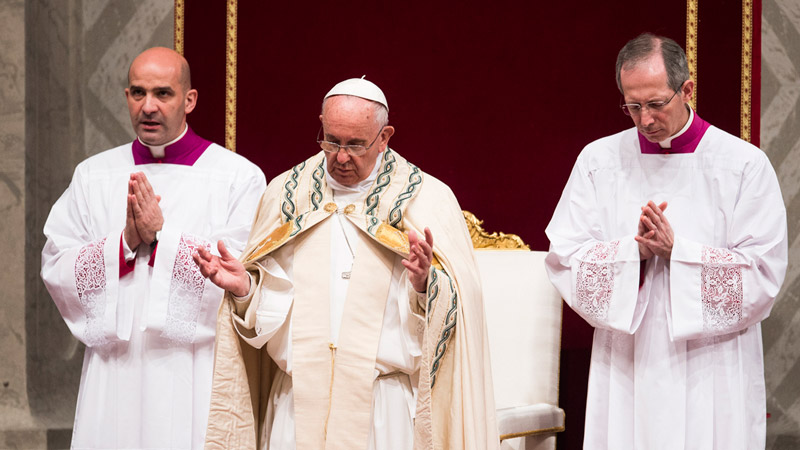
During the Jubilee of Mercy, Pope Francis directs us to pay particular attention to the works of mercy — corporal acts that address the needs of the body, and spiritual ones that tap into the needs of the soul.
Although the corporal acts are taken directly from the words of Jesus in Matthew 25, the spiritual works are compiled from His repeated teachings on love, such as forgiving sins, admonishing sinners, and educating those who are ignorant.
“When we attend to the needs of those in want, we give them what is theirs, not ours. More than performing works of mercy, we are paying a debt of justice …” states the Compendium of the Social Doctrine of the Catholic Church.
Just as Jesus attended to the spiritual well-being of those he ministered to, the spiritual acts help us address a poverty of spirit that can be even more debilitating than physical poverty.
The United States Conference of Catholic Bishops describes the spiritual acts of mercy and offers suggestions for daily involvement. Ask yourself in humble prayer which of these the Holy Spirit is guiding you to undertake.

Counsel the doubtful
“Listen to counsel and receive instruction, that you may eventually become wise.” (Prv 19:20)
Everyone has moments of doubt in their faith journey. Remember that Christ is the Way, the Truth, and the Life; turn to Him along the way and help others do the same.
- One way you can help is to accompany a friend who is struggling with believing to join a parish group for service or faith formation, or share a book or video you found useful.
 Instruct the ignorant
Instruct the ignorant
Jesus commands his apostles to “make disciples of all nations … teaching them to obey everything that I have commanded you.” (Mt 28:19-20)
Father James LeBlanc, pastor of St. Andrew Church in Myrtle Beach, said the first step is to read, study, and understand the faith.
“Instructing the ignorant becomes easier to do when you’re more confident yourself,” he said.
The USCCB notes that there is always more to discover about the faith, and suggests that people remain open to learning and sharing their beliefs with others.
- Take time to “tutor” those who are just beginning tasks.
- Read good literature and encourage others to do the same.
 Admonish the sinner
Admonish the sinner
“Remove the wooden beam from your eye first; then you will see clearly to remove the splinter from your brother’s eye.” (Mt 7:5)
Admonishing the sinner starts with oneself. It does not refer to passing judgement, as we are all sinners. Rather, it calls on us to create a culture that does not accept sin, but realizes we all fail. It calls us to be supportive in helping others find their way and correct mistakes. Together we can learn to walk more closely with God.
- A key step in admonishing the sinner is to practice what we preach and have compassion for human weakness.
 Comfort the sorrowful
Comfort the sorrowful
“Blessed are those who mourn, for they will be comforted.” (Mt 5:4)
Often, people avoid those who are sick or grieving because they don’t know what to say, but many times a friendly presence is all that is needed. Offer a hug and be there to listen.
Some other suggestions:
- Make a home-cooked meal for a friend who is facing a difficult time.
- Write a letter or send a card to someone who is suffering.
 Forgive offenses
Forgive offenses
“Be kind and compassionate to one another, forgiving each other, just as in Christ God forgave you.” (Eph 4:32)
Bishop Robert E. Guglielmone said it is important that we accept the mercy of God’s forgiveness and bestow it upon others, adding that it is impossible to live with bitterness and hatred while also walking in the way and light of Christ.
“It hurts us more; forgiving is liberation,” he said.
- Participate in the Sacrament of Reconciliation. It is a powerful way to find forgiveness for yourself and others.
- Pray the Divine Mercy Chaplet.
Bear wrongs patiently
“… Love your enemies, do good to those who hate you, bless those who curse you.” (Lk 6:27-28)
Do not be bitter about wrongs done against you. Place your hope in God so that you can endure the troubles of this world and face them with a compassionate spirit.
- When you are frustrated with someone, step away from the situation, take a few deep breaths, and pray the Our Father, asking God for patience.
 Pray for the living and the dead
Pray for the living and the dead
For the living, “the fervent prayer of a righteous man is powerful in its effects.” (Jas 5:16)
Prayer is one of the most powerful ways we can support others. Joining together in prayer for the living and the dead entrusts us all into God’s care.
Prayer can avert war, bring healing, cause conversion, bestow peace and serenity, and call down mercy.
Scripture also reminds us that we must never forget to pray for the dead, because all men must pass before the judgment of God before moving on to heaven.
As St. Paul writes, “we must all appear before the judgment seat of Christ, so that each of us may receive what is due us for the things done while in the body, whether good or bad.” (2 Cor 5:10)
- Request a Mass intention for a friend or family member who is going through a tough time, or for someone who has passed away.
- Keep your own book of prayer intentions, writing down the names of those you are keeping in your prayers.




